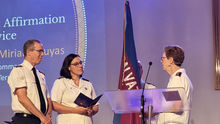Who cares on Australia Day ... and every other day?
- simoneworthing
- Jan 25, 2024
- 4 min read
Updated: Feb 1, 2024

BY MAJOR BRENDAN NOTTLE
As another Australia Day approaches, various voices are encouraging us to reflect on what sort of nation we want to be, and 2024 is already becoming a history-shaping moment.
Will this be the year when certain decisions will impact us as a city, state, nation and even as a global community for time immemorial?
My growing concern is that it is now too late for yet more chin-rubbing, musing and reflection over another Australia Day snag about who and what we want to be as a nation. My fear is the dice has already been rolled. It is now time to act.
This year’s Australia Day Lambassador TV ad is fun, quirky and very clever. But it has more than a kernel of truth at its heart. The ad focuses on our nation’s growing divide between the generations.
A comment by one of the Baby Boomers in the ad sums up the matter succinctly. “I don’t care what they do, just not in my backyard,” he bellows.
I’ll never forget a trip I made to Belfast, Northern Ireland, at the end of 2019. One Sunday, I went for a walk around the city. I stumbled upon a massive wall, one of 40 that runs through the city, standing up to 8m high and as long as 30km.
Sadly, they are called ‘Peace Walls’, designed to keep the peace between Catholics and Protestants. I remember feeling physically sick when I realised the only way a fragile form of peace could be maintained was by building giant, ugly walls.
Although we are not at risk of having the City of Melbourne build a physical wall down the middle of Bourke St, there is a clear sense that invisible walls have already been erected throughout the city and across the state.
As The Salvation Army maintains its care for some of the city’s most vulnerable, calls continue for the Salvos to relocate. The words of the Baby Boomer in the Lambassador ad, “anywhere but not in my backyard”, continue to ring out.
A city-based property manager’s comment to me in recent times still echoes: “This riff-raff should all be gathered up and thrown in jail.” He was referring to the hundreds of people who gather at The Salvation Army for support. I attempted to help the property manager understand some of the individuals’ circumstances, but his repeated response was, “Who cares?”
Names behind the faces
There is a woman in her mid-30s. She is well known to anyone who regularly frequents the city. Kerry* yells loudly at anyone who is visibly and, if truth be known, invisibly near her. Her mental health is extremely poor. The systemic response to Kerry is to simply move her on.
Last week, Kerry gave us another colourful outburst outside our building. My wife, Sandra, took the time to sit with Kerry and listen. Kerry shared that she was angry and frustrated because she had money in her bank account but could not access it as she was banned from banks and Centrelink offices. Who cares?
Simon*, in his early 40s, is in a similar position to Kerry. He has complex mental health issues, is loud, angry and very well-known around the city. He has a significant sum of money in his bank account but, like Kerry, has been banned from attending banks and Centrelink offices. Simon was recently charged with shop theft. He was simply trying to survive without money. His problems continue to escalate. But who cares?

Geoffrey* was in the Salvos cafe last week. Paramedics told him he urgently needed to get his left leg treated. If he didn’t, it would need to be amputated. The infection was horrendous, and the smell of rotting flesh was putrid. Unfortunately, we have no form of healthcare on-site at The Salvation Army at 69 Bourke St. It’s a massive gap in our service delivery.
Meanwhile, we keep receiving complaints about Frank*, an elderly man sleeping rough in a park in East Melbourne, doing nothing wrong other than being ‘unsightly’.
Frank lost his wallet, which contained all of his identification, and not knowing what to do, he just gave up. Our team got him into a house provided by Collingwood Football Club, and Centrelink staff helped him access some identification.
All these people are receiving ongoing care from the Salvos, but so much more needs to be done. I remain extremely frustrated that highly vulnerable people still cannot access basic and essential health and mental health support in situ – on location – where they gather. I see them suffer and, in many cases, die.
But there is hope.
Last Saturday night, I received a phone call from a prominent member of our city. She stumbled upon a distressed 20-year-old woman. Rather than ignore the problem, she spent most of Saturday night ensuring this woman received the support she desperately needed. She didn’t have to – she wanted to.
It is up to us to ensure the mantra of this city is not, “Who cares?” but “We care”. May that be the case this year for our city, state and nation as together we build bridges, not walls, in the great backyard we share.
* Not their real names.
This article first appeared in the Herald Sun newspaper.
Major Brendan Nottle runs The Salvation Army Project 614 in Melbourne






